Racial Justice Resources for Allies
Films and Videos
Movies on Netflix
 Time passes and tension mounts in a Florida police station as an estranged interracial
couple awaits news of their missing teenage son.
Time passes and tension mounts in a Florida police station as an estranged interracial
couple awaits news of their missing teenage son.
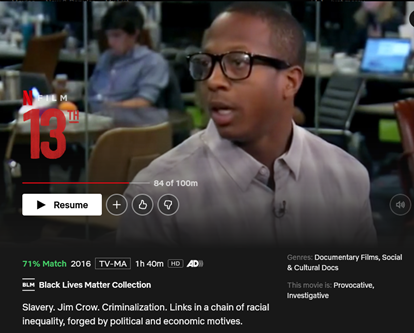 In this thought-provoking documentary, scholars, activists and politicians analyze
the criminalization of African Americans and the U.S. prison boom.
In this thought-provoking documentary, scholars, activists and politicians analyze
the criminalization of African Americans and the U.S. prison boom.
TED Talks
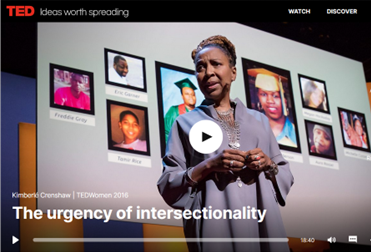 Now more than ever, it's important to look boldly at the reality of race and gender
bias -- and understand how the two can combine to create even more harm. Kimberlé
Crenshaw uses the term "intersectionality" to describe this phenomenon; as she says,
if you're standing in the path of multiple forms of exclusion, you're likely to get
hit by both. In this moving talk, she calls on us to bear witness to this reality
and speak up for victims of prejudice
Now more than ever, it's important to look boldly at the reality of race and gender
bias -- and understand how the two can combine to create even more harm. Kimberlé
Crenshaw uses the term "intersectionality" to describe this phenomenon; as she says,
if you're standing in the path of multiple forms of exclusion, you're likely to get
hit by both. In this moving talk, she calls on us to bear witness to this reality
and speak up for victims of prejudice
https://www.ted.com/talks/kimberle_crenshaw_the_urgency_of_intersectionality
 In an engaging and personal talk -- with cameo appearances from his grandmother and
Rosa Parks -- human rights lawyer Bryan Stevenson shares some hard truths about America's
justice system, starting with a massive imbalance along racial lines: a third of the
country's black male population has been incarcerated at some point in their lives.
These issues, which are wrapped up in America's unexamined history, are rarely talked
about with this level of candor, insight and persuasiveness.
In an engaging and personal talk -- with cameo appearances from his grandmother and
Rosa Parks -- human rights lawyer Bryan Stevenson shares some hard truths about America's
justice system, starting with a massive imbalance along racial lines: a third of the
country's black male population has been incarcerated at some point in their lives.
These issues, which are wrapped up in America's unexamined history, are rarely talked
about with this level of candor, insight and persuasiveness.
https://www.ted.com/talks/bryan_stevenson_we_need_to_talk_about_an_injustice
Other Videos
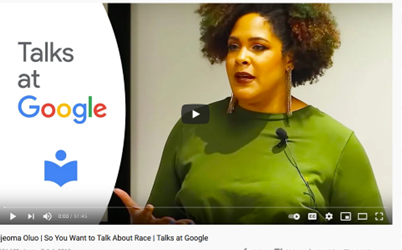 Ijeoma Oluo is one of the most influential people in Seattle, according to Seattle
Magazine. She's also the Editor-At-Large at The Establishment - a media platform run
and funded by women. In her new book "So you want to talk about race", she demonstrates
that her remarkable writing abilities by bringing clarity and insight to hyper-charged
issues facing America. She discusses why it's so hard talk about race and why we must
do it anyway. Get the book here: https://goo.gl/9WVg6g
Ijeoma Oluo is one of the most influential people in Seattle, according to Seattle
Magazine. She's also the Editor-At-Large at The Establishment - a media platform run
and funded by women. In her new book "So you want to talk about race", she demonstrates
that her remarkable writing abilities by bringing clarity and insight to hyper-charged
issues facing America. She discusses why it's so hard talk about race and why we must
do it anyway. Get the book here: https://goo.gl/9WVg6g
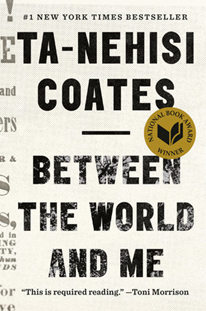 In a profound work that pivots from the biggest questions about American history and
ideals to the most intimate concerns of a father for his son, Ta-Nehisi Coates offers
a powerful new framework for understanding our nation’s history and current crisis.
Americans have built an empire on the idea of “race,” a falsehood that damages us
all but falls most heavily on the bodies of black women and men—bodies exploited through
slavery and segregation, and, today, threatened, locked up, and murdered out of all
proportion. What is it like to inhabit a black body and find a way to live within
it? And how can we all honestly reckon with this fraught history and free ourselves
from its burden?
In a profound work that pivots from the biggest questions about American history and
ideals to the most intimate concerns of a father for his son, Ta-Nehisi Coates offers
a powerful new framework for understanding our nation’s history and current crisis.
Americans have built an empire on the idea of “race,” a falsehood that damages us
all but falls most heavily on the bodies of black women and men—bodies exploited through
slavery and segregation, and, today, threatened, locked up, and murdered out of all
proportion. What is it like to inhabit a black body and find a way to live within
it? And how can we all honestly reckon with this fraught history and free ourselves
from its burden?
Between the World and Me is Ta-Nehisi Coates’s attempt to answer these questions in a letter to his adolescent son. Coates shares with his son—and readers—the story of his awakening to the truth about his place in the world through a series of revelatory experiences, from Howard University to Civil War battlefields, from the South Side of Chicago to Paris, from his childhood home to the living rooms of mothers whose children’s lives were taken as American plunder. Beautifully woven from personal narrative, reimagined history, and fresh, emotionally charged reportage, Between the World and Me clearly illuminates the past, bracingly confronts our present, and offers a transcendent vision for a way forward.
https://www.penguinrandomhouse.com/books/220290/between-the-world-and-me-by-ta-nehisi-coates/
Recommended Reading
 Antiracism is a transformative concept that reorients and reenergizes the conversation
about racism—and, even more fundamentally, points us toward liberating new ways of
thinking about ourselves and each other. At its core, racism is a powerful system
that creates false hierarchies of human value; its warped logic extends beyond race,
from the way we regard people of different ethnicities or skin colors to the way we
treat people of different sexes, gender identities, and body types. Racism intersects
with class and culture and geography and even changes the way we see and value ourselves.
In How to Be an Antiracist, Kendi takes readers through a widening circle of antiracist ideas—from the most
basic concepts to visionary possibilities—that will help readers see all forms of
racism clearly, understand their poisonous consequences, and work to oppose them in
our systems and in ourselves.
Antiracism is a transformative concept that reorients and reenergizes the conversation
about racism—and, even more fundamentally, points us toward liberating new ways of
thinking about ourselves and each other. At its core, racism is a powerful system
that creates false hierarchies of human value; its warped logic extends beyond race,
from the way we regard people of different ethnicities or skin colors to the way we
treat people of different sexes, gender identities, and body types. Racism intersects
with class and culture and geography and even changes the way we see and value ourselves.
In How to Be an Antiracist, Kendi takes readers through a widening circle of antiracist ideas—from the most
basic concepts to visionary possibilities—that will help readers see all forms of
racism clearly, understand their poisonous consequences, and work to oppose them in
our systems and in ourselves.
Kendi weaves an electrifying combination of ethics, history, law, and science with his own personal story of awakening to antiracism. This is an essential work for anyone who wants to go beyond the awareness of racism to the next step: contributing to the formation of a just and equitable society. (Amazon.com)
 In this groundbreaking book, therapist Resmaa Menakem examines the damage caused by
racism in America from the perspective of trauma and body-centered psychology.
In this groundbreaking book, therapist Resmaa Menakem examines the damage caused by
racism in America from the perspective of trauma and body-centered psychology.
The body is where our instincts reside and where we fight, flee, or freeze, and it endures the trauma inflicted by the ills that plague society. Menakem argues this destruction will continue until Americans learn to heal the generational anguish of white supremacy, which is deeply embedded in all our bodies. Our collective agony doesn't just affect African Americans. White Americans suffer their own secondary trauma as well. So do blue Americans—our police.
My Grandmother's Hands is a call to action for all of us to recognize that racism is not only about the head, but about the body, and introduces an alternative view of what we can do to grow beyond our entrenched racialized divide (Amazon.com)
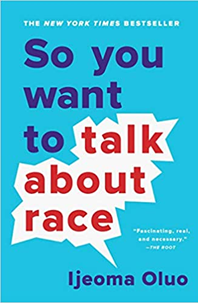 Widespread reporting on aspects of white supremacy -- from police brutality to the
mass incarceration of Black Americans -- has put a media spotlight on racism in our
society. Still, it is a difficult subject to talk about. How do you tell your roommate
her jokes are racist? Why did your sister-in-law take umbrage when you asked to touch
her hair -- and how do you make it right? How do you explain white privilege to your
white, privileged friend?
Widespread reporting on aspects of white supremacy -- from police brutality to the
mass incarceration of Black Americans -- has put a media spotlight on racism in our
society. Still, it is a difficult subject to talk about. How do you tell your roommate
her jokes are racist? Why did your sister-in-law take umbrage when you asked to touch
her hair -- and how do you make it right? How do you explain white privilege to your
white, privileged friend?
In So You Want to Talk About Race, Ijeoma Oluo guides readers of all races through subjects ranging from intersectionality and affirmative action to "model minorities" in an attempt to make the seemingly impossible possible: honest conversations about race and racism, and how they infect almost every aspect of American life.
https://www.amazon.com/dp/B07QBQF4GS/ref=dp-kindle-redirect?_encoding=UTF8&btkr=1